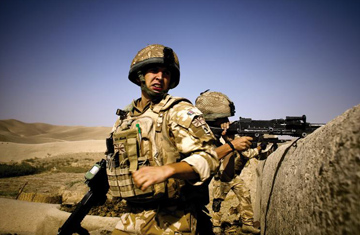
Battle Politicians say troops in Afghanistan deter terror at home. But the war is unpopular
(2 of 3)
British soldiers can certainly be overconfident. But John Nagl, president of the Center for a New American Security, believes the real roots of British humiliations in Iraq lie in London. "If the politicians back home are not completely committed to this thing, if they have not leveled with the people on the likely costs of the war, then you're putting an unsupportable burden on the army in the field in a counterinsurgency campaign," says Nagl. "And so as you look at explanations as to why the British army performed better in Malaya than Iraq, one of the questions is to what extent did the British government support the army better in Malaya, and to what extent was the government in Iraq only for a short, cheap war."
Nagl, a former U.S. Army officer, credits Britons with providing valuable expertise to their American colleagues in Iraq. "Much of what the American Army ended up doing in Iraq under General Petraeus was as a result of lessons learned largely from the British," says Nagl, who helped Petraeus revise the U.S. counterinsurgency manual. "My own evaluation of how the British army adapted to the demands of counter-insurgency in Malaya had some role in influencing how we thought about the importance of building an adaptive learning organization."
Indeed, once British forces acknowledged the flaws in their Iraqi strategy they successfully recalibrated their approach and made substantial strides in the stabilization of Basra before their final withdrawal last year. General Salmon, who took command of coalition forces in 2008, says he reinterpreted his role to be a "catalyst and a convening authority" for Basrawis and the different agencies working in the area, most of them outside his command. "As a military commander, not owning quite a lot of the other organizations and lines of development on the social, economic, political and development front, how do you then start to really fill the vacuum with positive things? That's the challenge we face," Salmon says. The reflexive assumption of authority that came with Britain's colonial power has no place in the messy conflicts of the 21st century. Says Nagl: "One of the keys to learning is to recognize that you don't know everything.
Something Rotten
Another key to learning is a readiness to confront past mistakes. In January, a British public inquiry into the Iraq conflict heard evidence from former Prime Minister Tony Blair. "In the end, [the war] was divisive, and I'm sorry about that," said Blair. But he continued: "If I'm asked if we're safer and more secure, I believe indeed that we are."
Such assertions cut little ice with 60% of his compatriots who, according to a survey for the National Army Museum, believe Britain should never have gone into Iraq. The real value of the inquiry may lie in the detailed testimonies provided by witnesses from politics, civil service and the military that are forming a kind of virtual manual of how to not to run such operations. General Frederick Viggers, Britain's senior military representative in Iraq in 2003, told the inquiry that a lack of expertise in Whitehall was responsible for — and continues to create — problems on the ground. "We are putting amateurs into really important positions and people are getting killed as a result of some of these decisions," he said. Nigel Adderley, a former army officer and now an analyst at the London-based International Institute for Strategic Studies, agrees there's a problem. "Today I don't think there's a government minister or anyone in the present government who has military experience. There becomes this disconnect between what the military is trying to tell the politician."
Britain has also begun to examine questions of its culpability for civilian deaths. A second public inquiry into the death of Baha Mousa, a 26-year-old receptionist killed in British custody in September 2003, has heard that internal warnings about the treatment of prisoners were ignored. "The procedure for detention and collection of evidence can only be described as a shambles," wrote Lieut. Colonel Nicholas Mercer, the army's senior legal officer in Iraq, in a memo written only months before Mousa's death. A further inquiry has started to examine claims that up to 20 Iraqi detainees were killed in British custody in 2004, an allegation denied by Britain's defense ministry.
